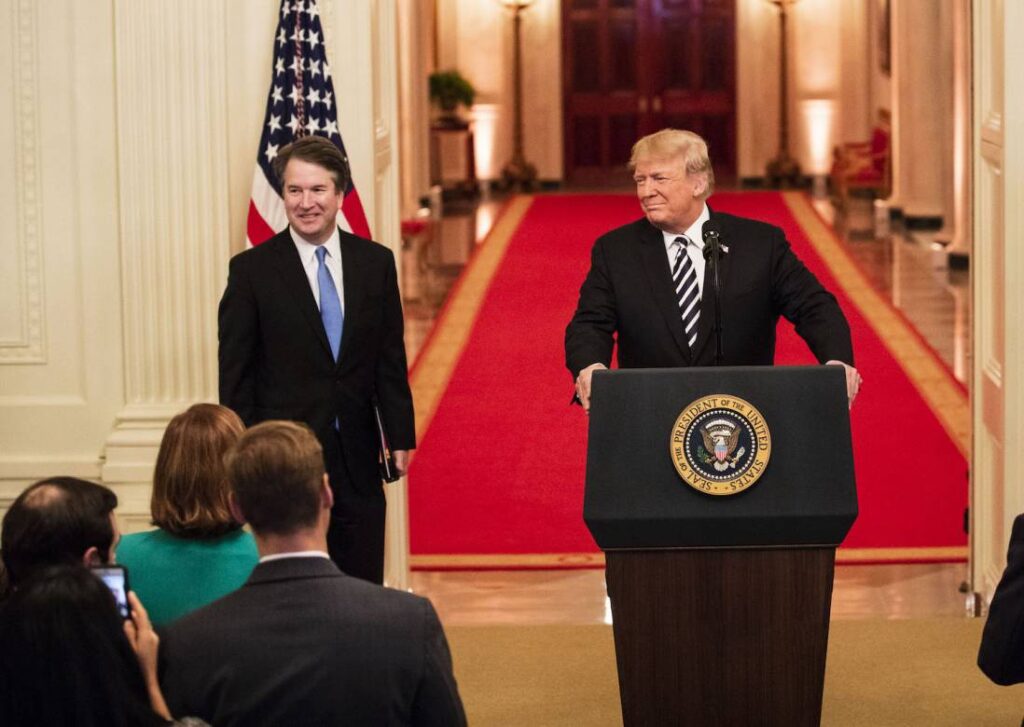Our country deserves better.
Last Friday, we lost Justice Ruth Bader Ginsburg, a lifelong warrior for civil rights. Immediately following her passing, the Trump administration greedily announced they would move forward with a nomination that is expected to be made in the coming days.
According to news reporting, the nominee is likely to be a woman, and among the top contenders are Judge Amy Coney Barrett (Seventh Circuit), Judge Barbara Lagoa (Eleventh Circuit), and Judge Allison Rushing (Fourth Circuit).
So, who are they?
Judge Amy Coney Barrett
- Judge Barrett is a 48-year-old white woman.
- Judge Barret joined a letter in 2015 supporting the position that “marriage and family is founded on the indissoluble commitment of a man and a woman” and the “significance of sexual difference and the complementarity of men and women.”
- Judge Barrett wrote a law review article promoting a theory that U.S. Supreme Court case law is broken down into decisions that operate as mere precedent and decisions that serve as “superprecedent” (decisions that no Justice would overrule). To a critic, this approach seems to allow the Supreme Court to more easily overturn cases it views as merely “precedent.” Unsurprisingly, Judge Barrett would not respond to questions posed regarding whether she believes Obergefell v. Hodges qualifies as “superprecedent.”
- Judge Barrett was sharply critical of Chief Justice Roberts’ opinion in NFIB v. Sebellius, which upheld the Affordable Care Act. Judge Barrett characterized the decision as pushing the ACA “beyond its plausible meaning to save the statute.”
- Judge Barrett joined an en banc panel refusing to hear an appeal of a case involving the segregation of Black workers at Autozone.
- Judge Barrett has given speeches for Alliance Defending Freedom, an organization whose animus towards the LGBTQ community is so great, it earned them a “Hate Group” designation from the Southern Poverty Law Center. When asked if she was aware of their classification, she pushed back, saying that they were only opining on a matter of “public controversy.”
Judge Barbara Lagoa
- Judge Lagoa is a 52-year-old Cuban-American woman.
- Judge Lagoa recently joined a decision to strip away the right to vote from formerly incarcerated people unless they paid several fees and fines. A federal district court ruled this law amounted to a modern-day poll tax that will significantly hinder the ability of a large number of residents to vote.
- As a Florida state Supreme Court Judge, Lagoa refused to hear a case challenging a voter-approved minimum wage law in Miami Beach, and Judge Lagoa held that Uber drivers were not eligible for unemployment benefits.
- Judge Lagoa refused to review a lower court’s decision to deny an immigrant’s petition for labor certification simply because he mistakenly checked the U.S. citizenship box on his driver’s license application form.
Judge Allison Rushing
- Judge Rushing is a 38-year-old white woman.
- Judge Rushing is a longtime, committed supporter of the aforementioned Alliance Defending Freedom. She began her legal career as an intern with them, and since then has continued and expanded her relationship with the organization, presenting to ADF audiences on at least eight different occasions in both their Virginia and Arizona offices.
- Judge Rushing criticized United States v. Windsor, the Supreme Court decision striking down the so-called “Defense of Marriage Act,” a statute that, in her view, reflected “traditional moral teachings reflected in heterosexual-only marriage laws.” Judge Rushing also criticized the Court for relying on its prior holdings in Lawrence v. Texas and Romer v. Evans.
There is an enormous amount at stake for the LGBTQ community in this fight. The U.S. Supreme Court decides cases involving a variety of legal issues affecting the lives of LGBTQ people and everyone, including the fate of the Affordable Care Act and the ability of governments to enforce laws prohibiting discrimination on the basis of sexual orientation and gender identity.
Every seat on that Court matters. We cannot count on the courts to defend our rights if we do not defend our courts from being packed with ideologues hostile to civil rights. The LGBTQ community deserves better, our country deserves better, and in this moment we must demand better.
Call your Senators today and let them know that the Supreme Court belongs to the people, and not to any one person or political party. No nomination should be considered or voted upon by the Senate until after the election.

